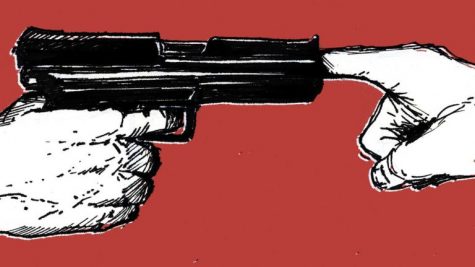I didn’t think Jason Van Dyke would be held accountable for the murder of Laquan McDonald. It seems very few did. Case after case, from the killings of Michael Brown Jr., Eric Garner, Tamir Rice, and many more, police officers were never held responsible for the killing of unarmed black men, women and children. It became easy to be skeptical of anything resembling justice or accountability. It was maddening at times to watch the crowds gather and cry for justice after each shooting, just for them to dissipate when it became clear that there was no justice. Then, it would just happen again and again. Veteran organizers and activists would sally out to demand justice, indictments or even just an acknowledgment that a death occurred, just for their hopes to be dashed yet again by a justice system seemingly designed to not touch the police. There was still a sense of excitement, tinged with dread of course, about the Van Dyke verdict. It was nice to think something good would happen, but resoundingly, in the face of case after case of “not guilty,” it would only follow that Van Dyke would go free.
But he did not.

Jason Van Dyke, a white police officer in the Chicago police department, was found guilty of second-degree murder and sixteen accounts of aggravated battery, one for each shot he fired at the prone seventeen-year-old black minor Laquan McDonald. It is hard to explain how rare it is for a police officer to be charged with murder or even manslaughter. The Justice Department doesn’t track the number of people killed by the police, but some experts estimate around 1,000 a year. The number of officers charged with murder and manslaughter between 2005 and 2015 was thirteen. It doesn’t take a mathematician to note the extreme discrepancy between the number of people the police kill and how many are ever charged. With these numbers in mind, the charging of Van Dyke is historic. It seems justice has at last been served in at least one case, and this calls for intense scrutiny of why this case, in particular, resulted in a conviction.
The shooting occurred on Oct. 20, 2014. Officers were called in response to reports that McDonald was carrying a knife. Within thirty seconds of Officer Van Dyke arriving on the scene and six seconds after exiting his vehicle, Van Dyke fired a shot at McDonald, who was walking away from him. McDonald fell the ground, but Van Dyke continued firing the entire magazine of service weapon at the prone minor. There were at least eight other officers on scene, none of whom fired a shot.
Initially, the account of the officers’ was that McDonald lunged at them, thus justifying the use of force. Later, the authorities released a police dashboard video that showed McDonald walking away from Van Dyke, demonstrating that the initial account was untrue. Over the course of the case, three other officers were indicted on conspiring to cover up the murder, the police superintendent Garry McCarthy was fired by Mayor Rahm Emmanuel, the prosecutor was voted out of office, and Mayor Emmanuel announced he would not run for a third term.
The case of the prosecutor being voted out and Mayor Emmanuel not running for reelection shows the political power that the protests over McDonald’s death had. Activists had a clear case to make against the city over its handling of McDonald’s murder. The release of the dashcam footage was delayed, the initial prosecutor Anita Alvarez waited 400 days to bring charges against Van Dyke, and many believed Mayor Emmanuel was not taking significant action to reform the police. With footage demonstrating that Van Dyke’s account was fabricated, and with a clear case that the city was failing to react appropriately to the public’s demand for justice, the McDonald case was poised to have a good chance of success.
The success of the McDonald case comes down to two factors: the change in prosecutor and the character of the officer. For an easy comparison, look at the Tamir Rice case. In the case of Tamir Rice, the officer fired quickly after being on the scene, similar to the McDonald case. However, the officer only fired twice. While it seems disgusting that the amount of times a police officer shoots a minor would matter, the difference in shots fired can easily sway a jury in the matter of maliciousness and brutality. Firing twice sounds reasonable, but unloading an entire magazine at a someone lying prone sounds and looks like murder. Jurors in the McDonald case stated that they believed Van Dyke acted on unreasonable fear, and that Van Dyke’s testimony “seemed rehearsed.” With Van Dyke’s lackluster performance in court on top of his fellow officers being indicted for conspiracy, it was quite obvious that Van Dyke was no angel.
Secondly, the change in prosecutor sets the McDonald case apart. The Tamir Rice case was plagued with allegations that the prosecutor was protecting the police, an allegation that is very easy to believe. Prosecutors work closely with police and it’s only natural that personal relationships develop there since the two rely on each other. In the McDonald case, bringing in a special prosecutor removes the risk of such conflicts of interest. This could perhaps be the biggest lesson from the McDonald case; prosecutors who are too cozy with the police should not be tolerated, especially when it is the police on trial.
This will be a time of celebration for activists and organizers who have witnessed far too many cases of the police evading accountability. There was justice for Laquan McDonald, a feat that at once feels like a miracle and the result of years of brutally hard work. While there has been no justice for Michael Brown Jr., Eric Garner or Tamir Rice, that justice was finally served in the McDonald case can serve as a respite in a desert of bad news.
For now, we can celebrate that justice has at last been served, and while this case hopefully sets a precedent for convicting killer cops, the work must continue.
—
For more information or news tips, or if you see an error in this story or have any compliments or concerns, contact editor@unfspinnaker.com.















